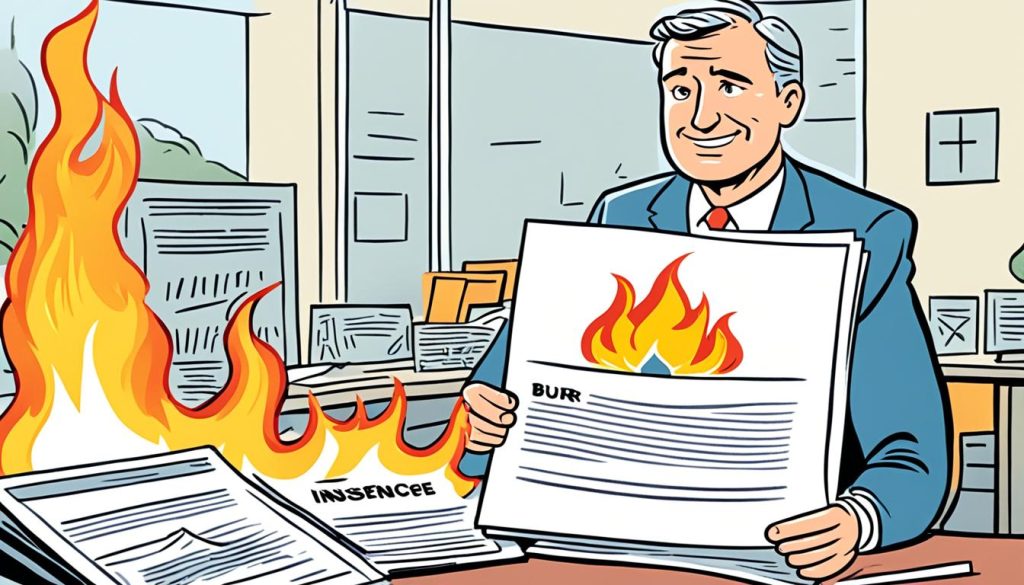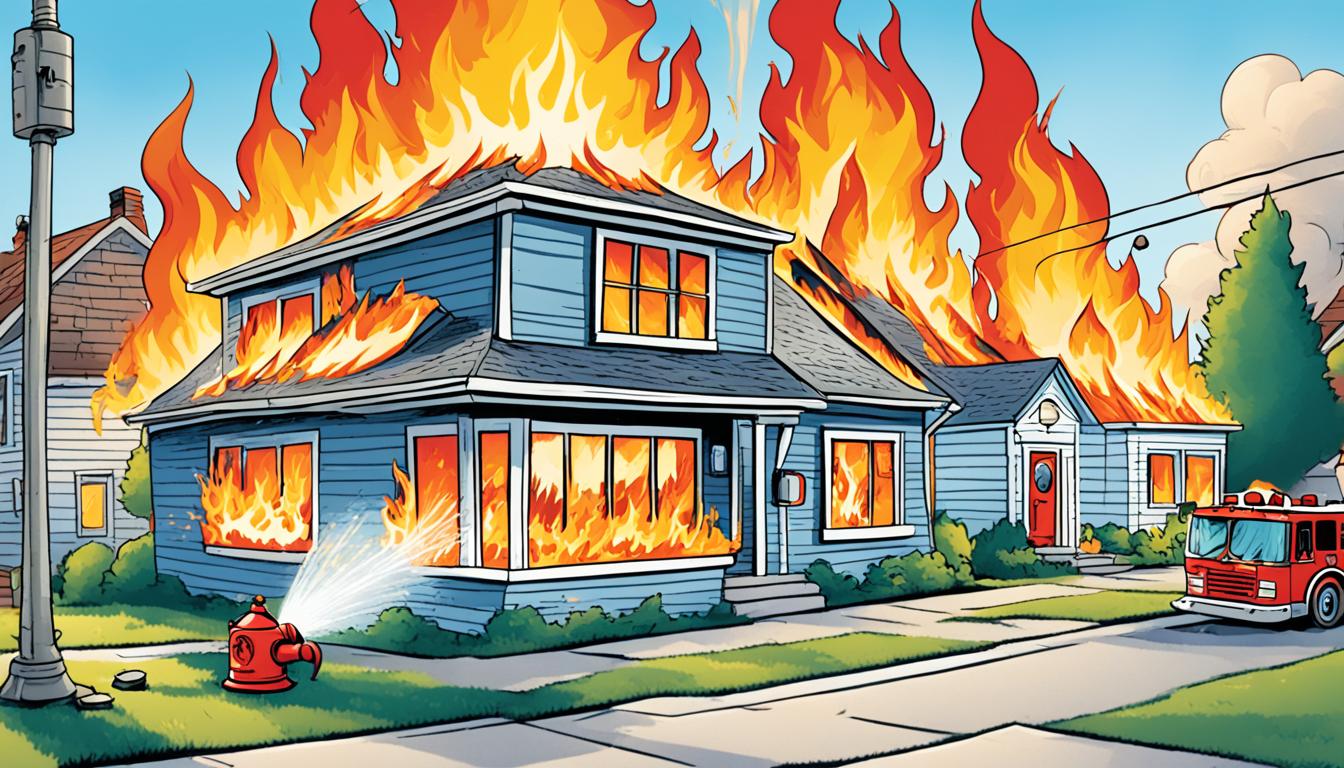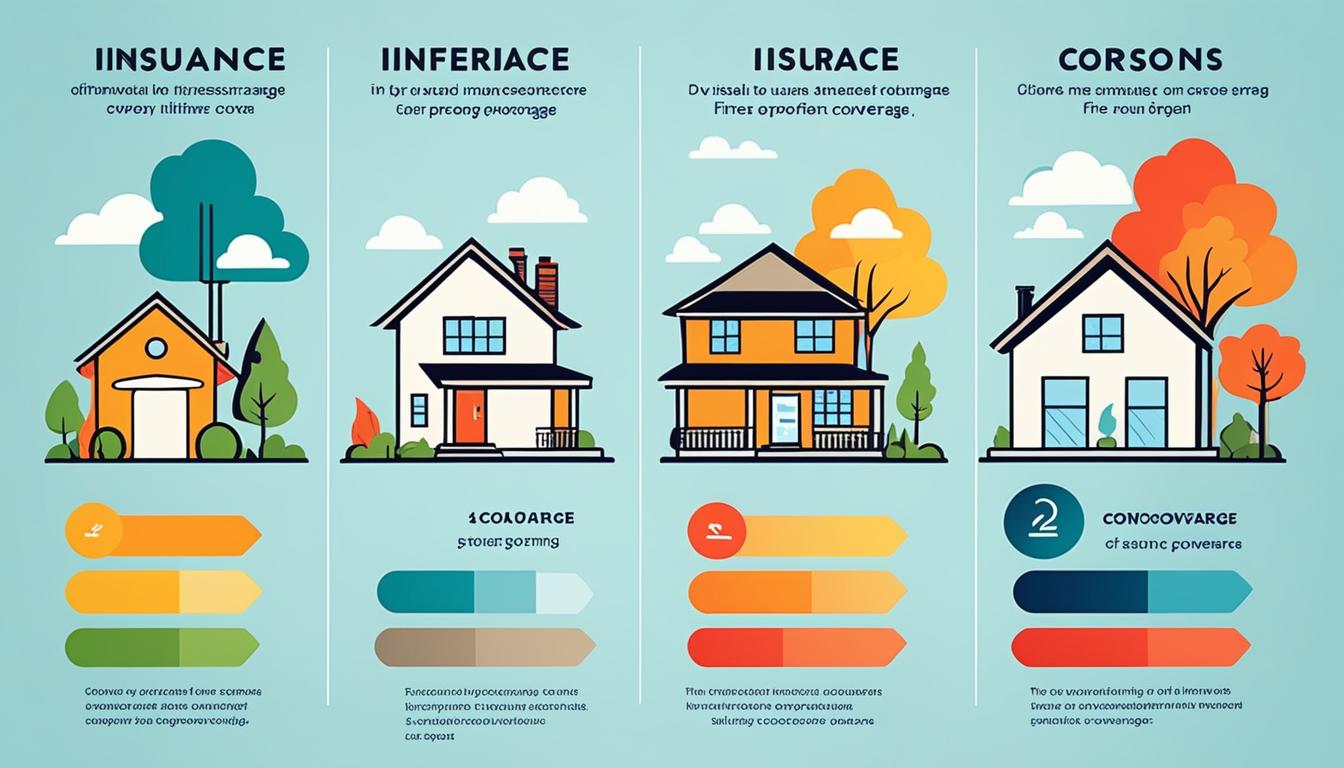Fire can strike unexpectedly, causing devastating damage to homes and businesses. That’s why having fire insurance is crucial to protect your assets and provide peace of mind. Whether you’re a homeowner or a business owner, understanding the importance of fire insurance is essential.
Fire insurance serves as a financial safety net, offering coverage for property damage and loss caused by fire. It ensures that you have the necessary funds to rebuild, repair, or replace your assets in the event of a fire. Without fire insurance, the costs of recovery can be overwhelming and may lead to significant financial hardship.
For homeowners, fire insurance is necessary to safeguard one of their most valuable assets: their home. Residential properties are susceptible to fire damage, which can not only result in the loss of the structure but also personal belongings and cherished memories. Having a fire insurance policy in place provides homeowners with the reassurance that they can rebuild their lives in the aftermath of a fire.
Similarly, businesses face significant risks when it comes to fire damage. A fire outbreak can not only destroy the physical infrastructure but also disrupt operations, leading to financial losses and potential bankruptcy. Fire insurance for business owners is essential in minimizing these risks and facilitating a quick recovery to keep the business running.
Choosing the right fire insurance policy is crucial to ensure adequate coverage. Factors such as coverage limits, deductibles, and additional endorsements should be carefully considered. Regularly reviewing and updating the policy is also essential to adapt to changing circumstances and protect your assets effectively.
Implementing fire safety measures can further enhance your fire insurance coverage. Installing smoke detectors, fire extinguishers, and sprinkler systems can not only save lives but also potentially reduce insurance premiums. Investing in fire safety shows insurers that you are proactive in minimizing risks, resulting in more favorable coverage terms.
It’s important to note that certain assets and industries may require specialized fire insurance coverage. These include high-value artwork, commercial buildings, and industrial facilities, among others. Tailored fire insurance policies for these specific assets and industries address unique exposures and ensure comprehensive protection.
Key Takeaways:
- Fire insurance is crucial for protecting assets against unexpected fires.
- It provides financial protection for homeowners and business owners.
- Choosing the right fire insurance policy and implementing fire safety measures can enhance coverage.
- Specific assets and industries may require specialized fire insurance coverage.
- Regularly reviewing and updating your fire insurance policy is essential to stay adequately protected.
Understanding Fire Insurance Coverage
When it comes to protecting your property and assets from the devastating effects of fire, having fire insurance coverage is essential. Fire insurance provides financial protection against property damage and loss caused by fire, offering peace of mind in the face of unexpected events.
One of the key benefits of fire insurance is its ability to cover the costs associated with fire-related damages. This includes expenses for repairing or rebuilding your property, replacing damaged or destroyed belongings, and covering any additional living expenses if you are displaced from your home due to fire damage.
Fire insurance policies typically include various types of coverage to meet different needs and circumstances. Common types of coverage found in fire insurance policies include:
- Dwelling coverage: This type of coverage protects the structure of your home or building, including walls, roofs, and other fixtures.
- Personal property coverage: This coverage extends to your personal belongings, such as furniture, appliances, electronics, and clothing, providing compensation for the cost of replacing or repairing them.
- Additional living expenses coverage: If you are temporarily unable to live in your home due to fire damage, this coverage can help cover the costs of alternative accommodations, such as hotel stays and rental expenses.
- Liability coverage: Liability coverage protects you in the event that someone is injured on your property due to a fire and files a lawsuit against you. It can help cover legal expenses and any resulting judgments or settlements.
- Medical payments coverage: This coverage provides reimbursement for medical expenses if a guest is injured on your property due to a fire, regardless of who was at fault.
Understanding the different types of coverage offered by fire insurance policies is crucial for ensuring you have adequate protection. By selecting the right coverage options, you can have the peace of mind that comes with knowing your property and assets are safeguarded in the event of a fire.
Types of Coverage in Fire Insurance Policies
| Type of Coverage | Description |
|---|---|
| Dwelling coverage | Protects the structure of your home or building |
| Personal property coverage | Covers the cost of replacing or repairing your belongings |
| Additional living expenses coverage | Provides compensation for alternative accommodations |
| Liability coverage | Protects against lawsuits resulting from fire-related injuries |
| Medical payments coverage | Reimburses medical expenses for fire-related guest injuries |
The Need for Fire Insurance: Homeowners Perspective
When it comes to protecting your most valuable asset – your home, the importance of fire insurance cannot be overstated. Fire damage can be devastating, causing not only physical destruction but also emotional distress. Fire insurance for homeowners is a crucial investment that provides financial security and peace of mind.
Homeowners face numerous risks that can lead to fire damage. Faulty electrical wiring, kitchen accidents, and natural disasters such as wildfires can all pose a significant threat. Without adequate fire insurance coverage, the financial burden of repairing or rebuilding your home can be overwhelming.
Fire insurance offers homeowners protection against property damage and loss caused by fire. In the event of a fire, your insurance policy can cover the cost of repairing or rebuilding your home, as well as replacing damaged or destroyed belongings. This coverage ensures that you can quickly recover and restore your property, allowing you to resume your normal life without undue financial strain.
Additionally, fire insurance provides liability coverage, which can protect you if someone is injured on your property due to a fire. Medical expenses and legal fees can quickly add up in such situations, but with the right insurance coverage, you can rest assured knowing that you’re financially protected.
It’s important to note that many mortgage lenders require homeowners to have fire insurance as a condition of the loan. This requirement ensures that both the homeowner and the lender are protected in the event of a fire.
Benefits of Fire Insurance for Homeowners:
- Financial protection against property damage and loss caused by fire
- Coverage for repairing or rebuilding your home after a fire
- Replacement of damaged or destroyed belongings
- Liability coverage in case of injuries or damages caused by a fire on your property
- Peace of mind knowing that your most precious investment is safeguarded
When it comes to protecting your home and ensuring the safety of your loved ones, fire insurance is a necessity. Don’t wait until it’s too late – take the necessary steps to secure your home with a comprehensive fire insurance policy today.
The Need for Fire Insurance: Business Owners Perspective
When it comes to protecting their assets, business owners face unique challenges and risks. One of the most significant threats that can disrupt a business and lead to devastating financial loss is fire. From small businesses to large corporations, no one is immune to the potential devastation of a fire outbreak.
That’s why fire insurance for business owners is not just a luxury but a necessity. It provides a safety net that can minimize the financial impact of fire-related damages, ensuring business continuity and facilitating a speedy recovery.
Fire insurance plays a critical role in protecting a business owner’s assets. It provides coverage for damage to the physical structure of the business premises, such as the building itself, fixtures, and equipment. Additionally, it can also cover the cost of replacing inventory, machinery, and other valuable assets that may be destroyed or damaged in a fire.
Furthermore, fire insurance can extend beyond the tangible assets of a business. It can also provide protection against financial losses resulting from business interruption due to a fire incident. This coverage can help business owners cover lost income and ongoing expenses, such as employee salaries, rent, and utilities, while the business is being restored.
Having fire insurance not only safeguards a business owner’s assets but also provides peace of mind. Knowing that there is financial protection in the event of a fire can alleviate the stress and uncertainty that come with unexpected disasters.
Moreover, fire insurance is often a requirement for business owners, especially those leasing commercial spaces. Landlords typically require tenants to have fire insurance as part of the lease agreement, ensuring that their property is protected from potential fire hazards that may originate from the tenant’s operations.
“As a business owner, fire insurance is essential for protecting your investment and ensuring the long-term viability of your enterprise. By investing in fire insurance, you are taking proactive steps to mitigate the risk of fire-related losses and secure the future of your business.”
Real-Life Example: Business Owners Affected by Fire
In February 2020, a fire broke out in the city’s downtown area, engulfing several businesses in its path. One of the affected business owners, Sarah Thompson, owned a popular local restaurant that was completely destroyed by the fire. Had it not been for her comprehensive fire insurance coverage, the financial burden of rebuilding her restaurant would have been insurmountable.
Thanks to her fire insurance policy, Sarah was able to recover her losses and successfully rebuild her restaurant in just a few months. Without fire insurance, Sarah’s dream of reopening her business may have been shattered.
This real-life example demonstrates the invaluable role that fire insurance plays in protecting business owners from unforeseen and potentially devastating fire incidents.

Choosing the Right Fire Insurance Policy
When it comes to protecting your property from the devastating effects of a fire, having the right fire insurance policy is paramount. The right policy can provide financial security and peace of mind in the event of a fire-related incident. To help you navigate the process of selecting the most suitable fire insurance policy, consider the following key factors:
- Coverage Limits: Evaluate the coverage limits offered by different insurance providers to ensure they align with the value of your property. Assess whether the policy adequately covers rebuilding costs, replacement of belongings, and additional living expenses if you need to temporarily relocate.
- Deductibles: Take into account the deductibles associated with the fire insurance policy. Higher deductibles often result in lower premiums, but it’s crucial to assess your financial capacity to pay the deductible in case of a fire-related claim.
- Additional Endorsements: Explore the availability of additional endorsements that can enhance your fire insurance coverage. These may include coverage for water damage, smoke damage, or valuable personal belongings.
Remember, selecting the right fire insurance policy is not a one-time decision. It’s important to review and update your policy periodically to ensure it adequately covers your evolving needs and reflects any changes in the value of your property. Consulting with a knowledgeable insurance agent can help you navigate the complexities of fire insurance policies and make informed decisions.
Expert Insight:
“Choosing the right fire insurance policy requires a thorough evaluation of your property’s value, an understanding of your risk appetite, and consideration of any specific endorsements that may be necessary. Regularly reviewing your policy is essential to maintain adequate coverage and protect your asset from the unpredictable nature of fires.”
– Mary Johnson, Fire Insurance Specialist
By carefully considering coverage limits, deductibles, and additional endorsements, you can ensure that you are selecting the right fire insurance policy to protect your valuable assets. Regularly reviewing and updating your policy will provide ongoing peace of mind knowing that you have comprehensive coverage in case of a fire-related incident.
Fire Safety Measures for Enhanced Insurance Coverage
Implementing fire safety measures is not only crucial for protecting lives and property, but it can also have a significant impact on your fire insurance coverage and premiums. By taking proactive steps to minimize fire risks, you can enhance your insurance coverage and potentially reduce the cost of your fire insurance policy.
One of the most effective fire safety measures is the installation of smoke detectors throughout your property. These devices can quickly detect the presence of smoke, allowing early warning and faster response to a potential fire. Smoke detectors are vital in both residential and commercial settings, as they provide invaluable time for occupants to evacuate and for emergency services to be alerted.
In addition to smoke detectors, having readily accessible and well-maintained fire extinguishers is crucial. Fire extinguishers can help control small fires and prevent them from spreading, minimizing damage to your property. Ensuring that fire extinguishers are regularly inspected, properly charged, and strategically placed in easily accessible areas can significantly improve your fire insurance coverage.
Another effective fire safety measure is the installation of sprinkler systems. Sprinkler systems are designed to automatically release water in the event of a fire, controlling its spread and minimizing damage. The presence of a functioning sprinkler system provides added protection and can enhance your fire insurance coverage, as it demonstrates a commitment to fire prevention and mitigation.
Fire Safety Checklist:
- Install smoke detectors on every level of your property
- Ensure smoke detectors are tested regularly and have fresh batteries
- Place fire extinguishers in easily accessible locations
- Maintain fire extinguishers and have them inspected periodically
- Consider installing a sprinkler system for added fire protection
- Develop and practice an emergency evacuation plan
By implementing these fire safety measures, you not only reduce the risk of fire-related incidents but also enhance your fire insurance coverage. Insurers value proactive risk management practices and are more likely to offer favorable coverage terms to policyholders who have implemented effective fire safety measures.
Fire Insurance for Specific Assets and Industries
In addition to providing coverage for homes and businesses, fire insurance also offers specialized protection for specific assets and industries. These unique exposures require tailored fire insurance policies to ensure comprehensive coverage and minimize financial risks. Let’s explore some examples of assets and industries that benefit from specialized fire insurance:
1. High-value Artwork
Owners of high-value artwork, such as collectors, museums, and galleries, face significant risks due to fire hazards. A specialized fire insurance policy for artwork provides coverage for damage or loss caused by fire, protecting these valuable assets from potential devastation. This coverage extends to both individual pieces and entire collections, offering peace of mind to art enthusiasts.
2. Commercial Buildings
Commercial buildings, including office spaces, retail establishments, and warehouses, require specific fire insurance coverage to safeguard the property, contents, and liabilities associated with these structures. A comprehensive fire insurance policy for commercial buildings ensures financial protection against fire damage, assisting in the rebuilding or replacement of the property and compensating for potential business interruption.
3. Industrial Facilities
Industrial facilities, such as manufacturing plants, refineries, and warehouses storing hazardous materials, are highly susceptible to fire hazards. These complex environments demand specialized fire insurance coverage to address the unique risks involved. A tailored fire insurance policy for industrial facilities provides comprehensive protection, covering property damage, machinery breakdown, business interruption, and potential liabilities arising from fire-related incidents.
Specialized fire insurance policies offer comprehensive coverage for high-value artwork, commercial buildings, and industrial facilities, protecting these assets and industries from the devastating impact of fires.
By investing in fire insurance policies specifically designed for these unique assets and industries, owners can have peace of mind knowing their financial investments are protected. These specialized policies address the specific risks and potential losses associated with fire incidents, providing a safety net during challenging times.
As one can see, fire insurance coverage goes beyond the standard policies for homeowners or general businesses. It extends its benefits to assets and industries with specialized needs, ensuring comprehensive protection and peace of mind.
Conclusion
Fire insurance plays an essential role in safeguarding assets from the destructive impact of unexpected fires. Whether you are a homeowner or a business owner, prioritizing fire insurance coverage is vital to protect your property and mitigate financial loss.
For homeowners, fire insurance provides peace of mind by offering financial protection against property damage caused by fire. It ensures that your most valuable investment is safeguarded, allowing you to rebuild and recover in case of a fire incident. With the devastating risks associated with fire damage, having comprehensive fire insurance coverage is a wise decision for homeowners.
Business owners, in particular, face significant risks due to fires. A fire can not only destroy valuable assets but also disrupt operations, resulting in revenue loss and potential closure. Fire insurance acts as a critical safety net, enabling businesses to recover faster and minimize financial impact. By choosing the right fire insurance policy, businesses ensure continuity, protect their employees, and safeguard their hard-earned reputation.
In conclusion, fire insurance is of utmost importance for both homeowners and business owners. It provides the much-needed protection against the unexpected and offers peace of mind in the face of fire-related risks. By recognizing the significance of fire insurance and securing adequate coverage, individuals and businesses can effectively manage their risk and ensure a secure future for their valuable assets.


